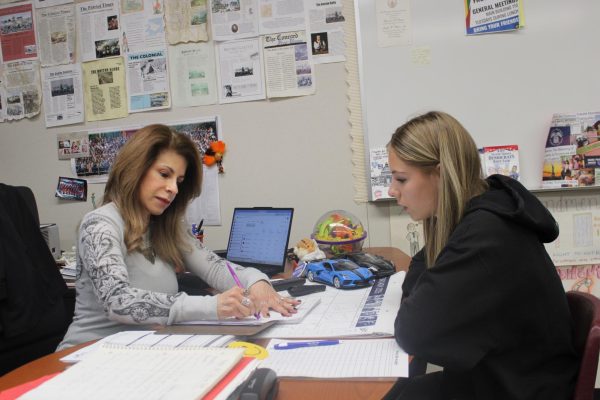Behind the social media craze
Negative side effects on teens revealed
Social media is perhaps one of the most interesting and intricate modern institutions of our time.
On one hand, it is a glamorous exciting world, a glittering ode to the new technology, territory that belongs almost exclusively to the new generation throughout the world.
On the other hand, it is undeniable the effects that excessive Internet use and constant exposure have had on all of its users.
Many find that it is all too easy to forget the negative effects that social media brings to the table.It is rare to find a teenager that is not guilty of falling into the time consuming trap that is social media.
According to a 2015 Pew Research Center report, 92 percent of teenagers ages 13-17 go on social media daily, and 24 percent say they’re online constantly.
A group of 15 Cal High students say that they spend at least three hours on the Internet on a typical day for a variety of reasons, ranging from listening to music to watching movies to looking at social media.
“I think, me being born in ’84, and being a ’90s baby, and seeing the lack of social media we had, the lack of accessibility, and how much more inclined we were to talk to each other, to go outside and play, was very healthy,” said Cal sociology teacher Eghosa Obaiza.
It is common knowledge that prolonged and constant exposure to too much of a good thing can be harmful.
Social media is a catalyst for mental illness and depression, with anxiety perhaps at the very forefront. The desire for validation is something every human is susceptible to, and it is an endless pursuit that makes a victim of any teenager.
“This constant need for other’s validation, minimizes our ability to be confident in ourselves,” said Obaiza.
Likes and positive comments can stimulate feelings of acceptance, but the amount of likes one gets on a photo can make someone feel like they are unpopular or unwanted if they do not get “enough”.
The comparison to their other fellow social media goers gives them something to live up to, which isn’t always attainable.
“I think we already see that it already has an impact when you look at kids in middle school posting pictures to get likes. I even had a student tell me if it has 20 likes, I’m deleting the pictures. It could be a great picture, but she doesn’t care. Not enough people show that they also like it,” said Obaiza.
Whether it’s the amount of likes one receives, the amount of followers one has, or just living up to other members posts. This can cause unnecessary stress that could lead to mental issues such as depression.
In a recent study Dr. Hugues Sampasa-Kanyinga of Ottawa Public Health in Canada determined a direct link to the amount of time spent on social media and mental health issues in children and adolescents.
This study was based on a survey done to 753 students grades 7-12. Students that reported an “unmet need for towards social media, and there is a scientific reason for it. According to California State Northridge, social media can be physically addicting.
When receiving likes on social media, the reward system in your brain is activated and releases dopamine, a chemical which causes people to associate this sensation of that of taking narcotics. Social media is a drug in its own right, one that keeps teenagers and adolescents trapped and coming back.
Cal psychology teacher, Hannah Cheng said, “We’re going to think the way we typically see things. Even if you’re aware of it, you’re still influenced by it. You want to be like things you see.”
With the high tech speed and constant availability of the internet for users, social media spread the posts of the users extraordinarily fast.
And yet, even though the premise of social media is promising and progressive, it is not without its many failings, especially pertaining to how it may affect the people that use it.
Social media has no filter, so anyone can post anything, and a single post can turn into a trend minutes. These fast developing fads combined with the over exposure to trends can engrain these images and ideas to an unfiltered eye such as the teenage users.
Social media is one of the greatest tools modern society has for spreading messages, information, and news.
But, in recent years, it has become a platform for the uninformed to spread their sometimes uneducated, ignorant ideas and opinions everywhere, propagandizing such information.
Sophomore Turvi Sharma said, “Social media is a great tool to share pictures and stuff, but there isn’t a 100% guarantee that the information on it is accurate, and that can be frightening, because a tag could be trending and be a complete hoax or lie.”
This is especially true in relation to the easy influenced teenager, who is just beginning to develop their own opinions and thoughts, and often give way to peer pressure and common opinion and thought.
“I think that when people take information from sources that could potentially be erroneous, it can be a danger to our knowledge and make us really more ignorant than we were, because we still think that we aren’t ignorant and are smart enough to make decisions without all of the proper facts, even though that isn’t true,” Sharma said.
In terms of fixes for the plethora of problems that social media brings, the only viable option at this point seems to be education.
AP Psychology teacher Brandon Quick says, “I think it’ll eventually work its way into health classes, as a mental-health topic and issue into mental health courses and curriculum. It’s an appropriate place but I think a lot of it [education] has to be at home as well. By the time a kid is fourteen, a lot of their self esteem is already developed so having parents hit that topic earlier, would really be helpful, bringing it in from a parent and a school perspective.”
Given the attachment that teenagers have to social media, attempting to reduce that attachment at this point would be futile.
Cheng said, “It’s messy. To fix it? I don’t think we can logically fix it, but I would agree with education, just teaching kids that social media isn’t everything.”
Social media has reached so much of the new generation that it is ludicrous to think that it can be done away with. Instead, educating youth on not only the dangers of predators on social media, but also the more common psychological effects of it would be more logical.
Obaiza said, “I think social media has a detrimental effect on people’s mental ability to connect with each other and understand each other, which is why I think we are living in a less compassionate world.”




